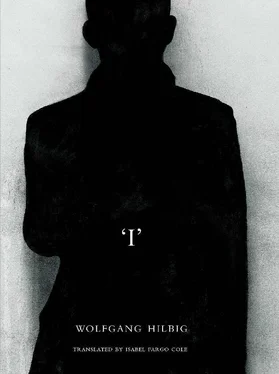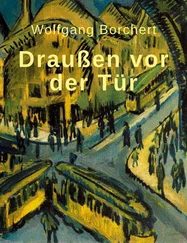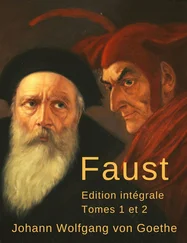Maybe, he continued his musings (a weekend had intervened), we ought to get ourselves transferred to the skinhead gang. Supposed there’s lots to do still in the department that does the skins and the punks. But then we’d have to run around in beat-up leather things, and we’d even have to duke it out now and then. I can’t stand bike chains, for Chrissake. So me, I’d rather stay in the world of signs and ask myself three times a day who we can do a favour for this time. Don’t you know anyone in the Scene who still wants to defect? One of these days we’ll be the only two hostile-negative forces left. . which isn’t so far off with you, you’re a poet after all.
Can’t we finally, Feuerbach was far from finished, get this son-of-a-bitch Harry Falbe to start writing poetry? I mean, he is someone who wants to get out of here still, right? I don’t understand why no one in your Scene wants to go West any more, when they all feel oh-so opted out. How can you want to live in a country you can’t work up the slightest interest in? Isn’t there anyone who wants to keep playing the same old game, out there in the world of signs? You’ve got to have heard some thing!
Everything I’ve heard, you know already, said W.
If that’s so, you’ll have to go in yourself and say you want to go West. Say you’re starting to get fed up. You’ll let that slip at some point, to someone the group trusts the most. Then we’ll see how the group reacts. Maybe you can get a few of them to go along with you, at any rate it’ll make them nervous. I’d give you completely free rein, say something about occupying an embassy for all I care. . say you have to put the authorities on the spot because here in this country you’re worried about your kid’s future. You do have a kid down there in A., don’t you?
A kid? said W., alarmed; Feuerbach’s poorly concealed edginess infected him. What’s the idea with the kid, most of them have kids themselves. They might nod sympathetically, but then they’d just say, that’s not our problem. .
That’s no good, said Feuerbach. They must have lost all sense of respect. Either you break the laws, or you back them. But you can’t act as if the State authorities. . or, as if we didn’t even exist any more.
Soon after these conversations the first lieutenant had vanished from the radar for some time; to be exact, first for about ten days, and then, after another seven days, for a whole month.—W. had listened to his case officer with malicious glee at first, but in the end with mounting concern. Then, left alone in the city, Feuerbach’s behaviour struck him as peculiar; never had he seen him in such suppressed agitation. For all his witty talk (which, incidentally, was starting to seem a bit stale), his testiness had been noticeable. . he’d given the impression of an imminent outburst. . or a breakdown?
Three times in the four weeks Feuerbach went missing (the entire month of April), W. had received a summons to a so-called meet-up to which the first lieutenant failed to appear; that was nothing unusual. Three times W. had found a sealed envelope with no address or sender, two in close succession in his postbox, the third slipped under his front door. Each time the envelope contained the same slip of paper with one solitary sentence: ‘You’ll meet me tomorrow 19.00 in the cafe on Frankfurter Allee’; there was no signature, the date was noted in pen on the upper right-hand edge, so miniscule that it could hardly be in Feuerbach’s lavish hand. The message on the slips of paper had been typed, but only once, and then duplicated on a photocopier. . W. pictured the machine spitting out thirty such copies in barely a minute — perhaps he could expect still more of these notes, until such time as he finally ignored them. . and then there’d be hell to pay. Feuerbach’s typewriter was the same model W. used. . and sometimes he’d suspected that Feuerbach had been in his flat and typed there at his machine; W. had found nothing to confirm his suspicion. When he received the third note, W. didn’t even go to the cafe; a few days before, he’d tried to see his case officer in the office but hadn’t been admitted; an unfamiliar middle-aged woman had turned him away: Feuerbach. . she didn’t know a gentleman of that name!
On the day of the third meet-up he’d had other plans, he’d gone out to visit Frau Falbe, for the second time that spring. He’d asked his former landlady whether she would rent him the room again — for the entire summer, perhaps the autumn as well, in addition to his flat, he could afford that now. He needed a crash pad for writing again, where he could be by himself once or twice a week. — Frau Falbe was dismissive, seeming mistrustful of him; he had to come by a few more times, and finally, towards the end of April, she consented. — Harry never paid me anything, she said, but I can use the bit of extra money. You’ll have to pay full, even if you’re not here every day. . and one more thing, I can’t make you coffee every day. — So the next time he came he brought her a pack of coffee he’d bought at an Intershop; since several of his poems had been printed in West German magazines, he’d acquired a number of Forum cheques which allowed him to make such privileged purchases.7 Frau Falbe accepted the present without a word, apparently still mistrustful; as she went, W. thought that she suddenly displayed a frailty far from befitting her. W. felt a sense of disappointment; he’d recalled her as a woman still full of resilience, and asked himself how the past year and a half could have made such a difference.
That evening he’d moved his books and manuscripts to Frau Falbe’s room. Feuerbach’s temporary disappearance gave him the opportunity to set up a hideout. . Frau Falbe as the holder of the duplicate key was much more palatable to him than Feuerbach. . who might well think that W. saw the downtown flat solely as an office now. . and these were his exact first words when he was back in town (incidentally seeming a totally different person, in the best of moods, at least at first, and radiant over his promotion. .).
W. had taken only those manuscripts which he felt were current (which he’d written most recently. . which he’d failed at most recently — in other words, only literary manuscripts!); he left the older ones on the desk as camouflage. . and he left all his other notes as well: this way the downtown desk was like a silent reproach! Feuerbach would see them if he came, the notes scattered all around the typewriter: started and scrapped again, started afresh and scrapped anew, the reports that had been written in a void ever since the first lieutenant had abandoned his reporter without notice. And in between, time and again, the remnants of his poetic efforts, completely buried by the dry verbal chaff of laborious logs.
Returning to the tiny street in the south of the city with his bag full of papers, he automatically watched for the light in his window. . he missed the window, since the light was out, the blind down. He realized this but kept walking almost to the end of the street, for he suddenly felt as he had that early spring day two years ago when he’d first come upon this street. . perhaps because of the stirring of mild air this evening? — Then, too, he’d felt ‘newly born’, and not just because he already sensed the spring. This year it was several weeks later, more than a month into spring, and yet the light of the evening seemed darker. . Had two years really passed since then? he asked himself suddenly. — No, these years had departed his mind, they were lost, and it could just as well have been three or four — they’d passed as though in a dream, flitted away, in a wink, as they say. . they seemed not to have existed for him. And all he knew was that in this time he’d failed at everything he’d tried to write. . absolutely everything? It was depressing, but that would change now. .
Читать дальше












